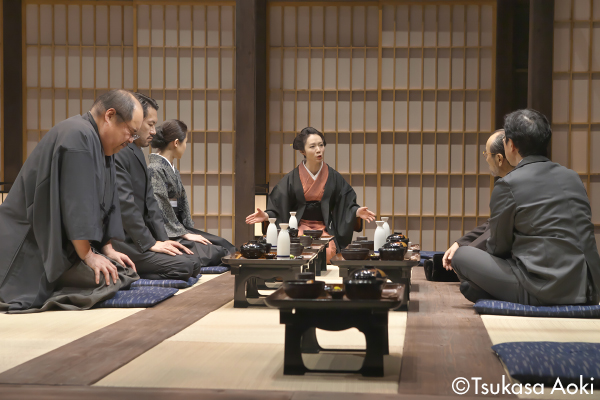
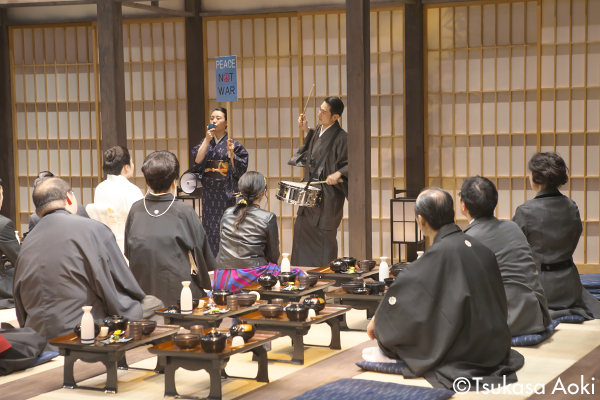
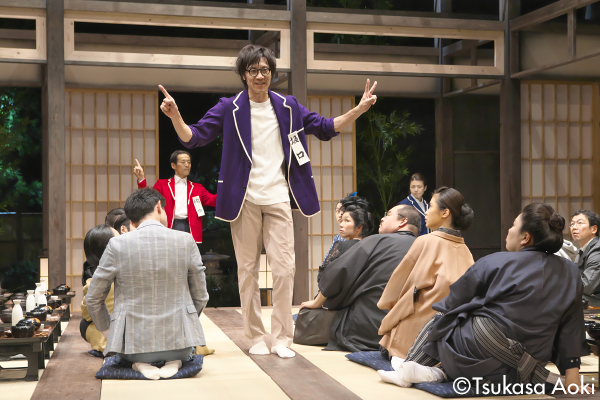
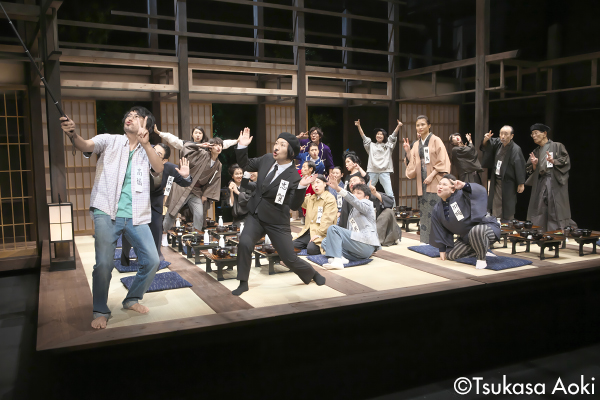
Seinendan 79th production
History of the Rise and Fall of Japanese Literature
(Jun. 7 – Jul. 9, 2018 at Kichijoji Theatre) Photo: Tsukasa Aoki
Nihon bungaku seisui shi (The Rise and Fall History of Japanese Literature)
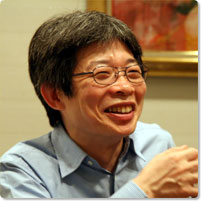
Born in Tokyo in 1962, Oriza Hirata is a playwright and director and the leader of the theater company Seinendan. He is also the artistic director of the Komaba Agora Theater in Tokyo and artistic director of Kinosaki International Arts Center. He is a specially appointed professor of the Organization for COI at the National University of the Arts, Tokyo, a visiting professor and special counsel to the president of Shikoku Gakuin University, a visiting professor at the Kyoto Bunkyo University, he is president of the Theater Professional Conference of the Japan Performing Arts Foundation, manager of the Fujimi Municipal Hall Kirari Fujimi, a director of the Japanese Society for Theatre Research, a director of the Japan Foundation for Regional Art Activities, a cultural policy advisor for Toyooka City, and a director of the Nagi Town Education, Culture and Community Development committee.
At the age of 16 Hirata took a leave from high school and set off to travel around the world by bicycle, eventually riding through 26 countries worldwide over the course of 18 months. In 1984, he graduated from the Liberal Arts School of the International Christian University in Tokyo. During his time at the university he formed the Seinendan theater company. In his Junior year at the university, Hirata got a scholarship to study abroad at South Korea’s Yonsei University for one year.
He won the 39th Kishida Kunio Drama Award for playwriting with Tokyo Notes in 1995, after which he won many prizes up until 2019, when he won the 22nd Tsuruya Nanboku Drama Award for History of the Rise and Fall of Japanese Literature . In 2006, he won the Montblanc de la Culture Arts Patronage Award. In 2011, he was awarded the L’Ordre des Arts et des Letters of the French Ministry of Culture.
Oriza Hirata has been one of the key figures in the contemporary theater scene in Japan with his “contemporary colloquial theater theory.” He has actively undertaken many collaborative productions abroad, in countries including France, South Korea, China. From 2008 to 2013, he served as chairman of the Japanese committee for the BeSeTo theater festival. Also, at his public small-theater Komaba Agora Theater he has pursued the education and nurturing of young theater makers. He has also achieved notable achievements in the areas of communication education through theater and theater instruction at the university level. Through his activities as artistic director at public theaters and publications like his book Geijutsu Rikkoku Ron (Arts as the Basis of a Nation, 2002) and other efforts, he has remained an opinion leader in the field of public policy concerning the arts and culture at the national and local government levels.
Seinendan website:
http://www.seinendan.org/eng/




Seinendan 79th production
History of the Rise and Fall of Japanese Literature
(Jun. 7 – Jul. 9, 2018 at Kichijoji Theatre) Photo: Tsukasa Aoki
Scene 1: May 1894, the night of the wake for Toukoku Kitamura after his suicide
Three men from the neighborhood, Tanaka, Sato and Suzuki, are at the wake making small talk using Kitamura’s suicide as a topic, saying things like, “Can a person really die for literature?”
Kitamura’s students Touson Shimazaki and Tatsunosuku Hasegawa (Futabatei Shimei) enter. Hasegawa tells Shimazaki that he has trouble with novels and he could never be like Kitamura.
Tanaka, Sato and Suzuki talk on about everyday topics, and after Suzuki mentions that he once went to see the play
Hamlet
with Kitamura, the conversation suddenly jumps to the present with talk about Yukio Ninagawa’s production of
Hamlet
.
Shimazaki asks Hasegawa about his opinion of Kitamura’s dramatic poetry collection Houraikyoku. Hasegawa says that like in Chekov’s
The Seagull
, the person comes out and just talks on and on. Nothing is ever brought to a conclusion. There may have been something like that kind of Chekov play that Kitamura was striving to write.
At the wake, Kitamura’s student Seiryo, the literature magazine
Bungaku-kai
editor Tenshi Hoshino and the Freedom and People’s Rights movement activist Masao Ooya join the mourners. As they talk about the Freedom and People’s Rights movement that Kitamura was part of and the political situation with Korea and China, the poet Ichiyo Higuchi and Ogai Mori come to pay their respects by lighting incense at the alter.
Kitamura’s widow, Mina, give a formal greeting speech to the mourners.
The aspiring author of amusement novels, Toyo Ozaki enters along with the leader of the Kenyusha writers’ society, Katai Tayama. Mina, Mori and Hasegawa talk about the popular-selling novels that are that constitute the opposite pole from Kitamura’s pure literature. Tayama says that there was truth to be found in the novels of Kitamura.
Having sent a message by LINE that he would be late, Soseki Natsume finally arrives along with Shiki Masaoka. Leaving the other writers to critique their writing, Natsume and Masaoka go with Mina to light incense at the alter.
Ooya tells Mori, who has served in the military, that he is going to Korea to support the independence movement. Ooya shouts, “This country still needs to fight harder [for freedom and independence].” Hasegawa asks Mori, “Isn’t it possible to create a country for the people and of the people without a revolution?”
Chomin Nakae and Shusui Kotoku enter. Hoshino says that literature alone wasn’t the cause of Kitamura’s death, and asks if a big part of Kiramura’s disheartenment wasn’t the result of seeing how the fickle public disserted the Freedom and People’s Rights movement. Nakae counters that it attributing Kitamura’s death to literary struggle would be best in order to make him a legend.
When the literary magazine
Bungaku-kai
was first published, Kitamura would write on Twitter every night tweets like, “Only a few years have passed since the birth of Japanese literature, it is still in its infancy.” Mori whispers, “It was not just literature, it was the weakness of the people of this country [that won’t fight for their rights].”
Higuchi is speaking her mind about the gender issue and talks about her upcoming short novel
Ootsugomori
. She declares that she is determined to keep writing about the struggles of the poor, and she asks Mori what can be done about the fact that the poor don’t read novels to begin with. Mori replies that things might change if the country becomes a bit more affluent.
The ailing Masaoka invites the others to come outside and play baseball with him rather than just sitting inside and talking about literature.
Finally it is just Shimazaki and Tayama that are left inside. Talking in a self-deprecating tone about their introverted nature, Shimazaki goes on to say, “I want to write the poems that Kitamura tried but failed to write,” and then recites a line from the poem
Hatsukoi
(First Love).
Scene 2: September 1902, the night of the wake for Shiki Masaoka, who died after a long illness
Shimazaki has stopped writing poetry and is now a teacher in Koromo, and Tayama is now a porn video director. Masaoka’s students, Kyoshi Takahama and Hekigodo Kawahigashi are receiving the mourners that arrive, including Mori and Kokko Soma (maiden name Seiryo) the essayist and entrepreneur who founded the Nakamuraya bakery.
Takahama said he tried to reach Natsume who is studying in London by SKYPE but couldn’t get an answer. Masaoka and Natsume had been exchanging letters and Takahama says they created a new kind of prose in the process, as he reads some excerpts out load.
Masaoka’s mother Yae and sister Tsu enter. They address the mourners while adding bits about contemporary hot issues and scandals from their Matsuyama.
Akiko Yosano and Takuboku Ishikawa enter. The sixteen-year-old Ishikawa, who refers to himself as a genius who can turn any thoughts that come to mind into poems, converses in poetry. Yosano leaves with Ishikawa after berating Tayama for using a play on one of her poems as the title for a porn video.
Kawahigashi, Mori, Takahama and Shimazaki exchange about thoughts about Yosano’s poems and rumors about her relationship with her husband Tekkan. In 1904, on the eve of the impending war with Russia, Hasegawa had been a newspaper correspondent in Russia, where he says he was deeply impressed by Russian literature. Mori says that there are no novels in Japan that are powerful enough to influence society like Russian literature does.
Sachio Ito, Soma’s younger colleague Yae Kotegawa (Yaeko Nogami) arrive, bringing a new product of the Nakamuraya bakery, a cream-filled roll.
Shusui Kotoku and Doppo Kunikida enter. Mori praises Kunikida’s book
Musashino
that he wrote purely in conversational style after being inspired by Hasegawa’s translation of Turgenev’s
Brief Encounter
. He goes on to say that none of us can yet write real prose, so we can’t fully express our thoughts in writing, but he believes that someone in this group will someday write a new kind of novel.
In his address to the mourners, the president of the Nippon Shimbun-sha newspaper company, Katsunan Kuga, talks about Masaoka’s great literary achievements.
Shimazaki and Tayama remain after everyone else has left. Shimazaki says, “I’m going to write a novel about a main character that no one in Japan has ever written about before.”
Scene 3: June 1909, afternoon of the funeral of Shimei Futabatei (Hasegawa)
Shimazaki and Tayama have both become famous after releasing successful works. Suzuki and Tanaka are boasting to each other.
Ishikawa, Yosano, Bokusui Wakayama, Hakushu Kitahara, Mori, Natsume, Sato and others enter one after another. All reminisce about Hasegawa, who fell ill and died on board ship while returning from Russia. They go on to tell each other about their current state of affairs and rekindle friendships.
In order to concentrate on writing, Natsume has taken a position as head of the literature department at the Tokyo Asahi Newspaper. In order to help the Hasegawa family, he is going to release a full collection of Hasegawa’s writing and is having Ishikawa in charge of editing the publication.
Ishikawa continues to converse in poems, and Kotoku (who the following year will be sentenced to death along with many socialists and anarchists for plotting assassinate the Meiji Emperor) enters with his illicit lover Sukako Kanno. Mori advises to suppress his extremist political activities and think more about taking care of himself.
Natsume tells Shimazaki that he wants to see what Hasegawa saw and announces that he is going to Manchuria in search of it. With Japan’s annexation of Korea and the prospects of a second war with Russia, dangerous clouds hang over Japan’s international relations. Natsume and Ishikawa discuss the editing of the full collection of Hasegawa’s writing to be published, while Tanaka and Sato interject comments about the latest popular TV drama
Jimi ni Sugoi Koetsu Girl
.
Hasegawa’s mother, Shizu, and wife, Riu, enter. Like the other families of the Meiji period literati, the Hasegawa family mother and daughter-in-law don’t get along. As Shizu gives her address to the gathered mourners, she can’t help but throw in comments about how the literati are all to blame for this and that problem. At the wake, conversation turns to the Mori’s
Hanjitsu
that complains about the battles between one’s mother and wife.
The chief editor of the Tokyo Asahi Newspaper, Sanzan Ikebe addresses the mourners.
Hogetsu Shimamura enters. Shimamura and Shobo Tsubouchi have started the Bungei Association and for their opening event they stage a production titled
Shakespeare
. Natsume asks why they chose Shakespeare, to which Shimamura admits in remorse that his affair with the actress Sumako Matsui has cause a falling out with Tsubouchi.
Kotoku and Kanno re-appear beating drums and shouting in chorus the revolutionary Chants “Katsura yamero!” and “Anarchist communism.” Kanno asks Mori, “We have ideals, and all we did was state them. Is it a sin to think? Is it a sin to speak your mind?”
Natsume states, “For 20 years we have been thinking about how to express our inner thoughts,” and he concludes that now that the literati have become able to put the truth in words and win the hearts of many, and in the process words have become a threat to the nation, the enemy of the nation.
Shimazaki and Tayama sit in dazed amazement.
Scene 4: December 1916, the night of Soseki Natsume’s funeral
Shimazaki and Tayama are present. Prominent literati who knew Natsume appear one after another and exchange greetings. Among them are Shimamura, whose Bungeiza has become very popular and Sohei Morita who has written a novel about his love affair and failed love suicide attempt with Raicho Hiratsuka. They all wear name tags on their chests.
Natume’s wife, Kyoko addresses the mourners. She says that thank to the NHKTV drama about her, the false reputation of her as a bad wife has been cleared.
In the mourning hall there is a plentiful supply of rumors about the love affairs and the like among the literati to talk about. On the scene appears Kenji Miyazawa, carrying a skateboard and rapping as he enters. The 20-year-old is a new talent in the literature world. He is one who will write new forms of novels and poems that no one has imagined yet, but he predicts that they won’t be recognized for their worth until after he has died.
Tsubouchi enters. Shimamura bows in apology for the fact that Tsubouchi had to pay off the debt that was revealed when their Bungei Association disbanded.
Three members of the future Buraiha (Decadent School), 10-year-old Ango Sakaguchi, 3-year-old Sakunosuke Oda and the 7-year-old Osamu Dazai enter. They pronounce that after the old generation has reduced Japan to ashes [in WWII] they will be the ones to build the new literature. Mori is relieved to see that after Japan’s impending downfall, Japanese literature will live on.
The three members of the Decadent School predict the future. The time will come when novels can be read on cellphones and the Internet, anyone will be able to write and no one will read what is written. Eventually, novels will be written by machines, with ideal novels written from data of past masterpieces, and those who read them will never read one again. After hundreds of millions of years of silence, somewhere on the planets that have been colonized, a new Toukoku Kitamura, a new Hakushu Kitahara will be born.
Genichiro Takahashi enters carrying his smartphone on a selfie stick. He asks all of the mourners gathered to let him take a picture for his novel archive. Then music fills the stage and everyone starts dancing wildly.
Related Tags